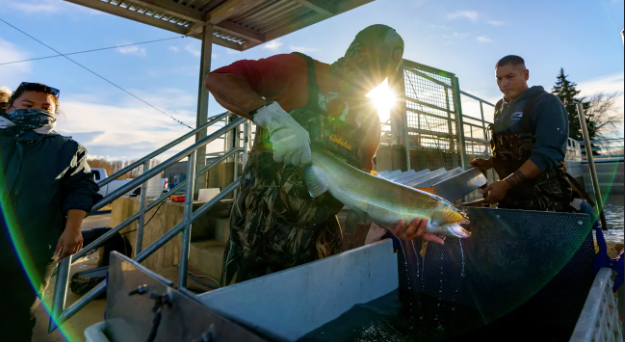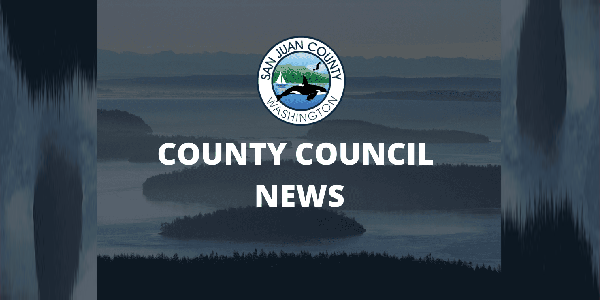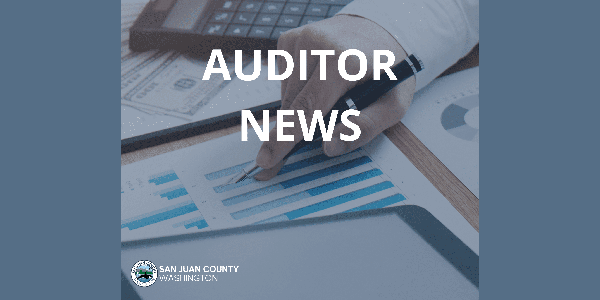||| FROM PROPUBLICA.COM |||
When the Biden administration said it had reached a “historic” legal deal with Northwest Indigenous tribes last week to save endangered salmon, no one could agree on what it meant for the tribes’ costliest and most controversial demand: the removal of four hydroelectric dams that hinder fish from their migration out to sea and home to reproduce.
Some said the deal, in promoting renewable energy that can replace hydropower, virtually ensures the dams on Washington’s Snake River will come down. Others said the White House did little for dam removal because it punted the question to Congress.
Largely overlooked in the debate was one seemingly technical provision that is far less open to interpretation and of great importance to the tribes. Not only does the deal offer $1 billion in new funding for Columbia River salmon restoration, but for the first time it also grants states and tribes control — not the Bonneville Power Administration, which sells hydropower from Northwest dams — over how that money gets spent.
The shift, while not flashy, addresses one of the biggest sources of frustration for tribes that ProPublica and Oregon Public Broadcasting highlighted in the investigation “Broken Promises.”
“We don’t need an energy agency to be telling us how this fund should be utilized,” said Yakama Nation council member Jeremy Takala.
The Bonneville Power Administration, which has historically decided how salmon recovery money gets spent, is under a sometimes conflicting mandate: to sell hydropower from federal dams and operate as a for-profit business, but also to save salmon harmed by that hydropower production.
The Oregon Public Broadcasting and ProPublica investigation found that Bonneville time and again prioritized its business interests over efforts to restore salmon populations. It actively pushed back on tribal initiatives and flatlined budgets in ways advocates said starved recovery efforts, even as the agency raked in record revenues.
Under the new agreement, Bonneville will invest $300 million over 10 years into salmon programs, including habitat restoration and much-needed upgrades to fish hatcheries, overseen by tribes and the states of Oregon and Washington. Companies and families that buy power from Bonneville will pay some of the cost in the form of an estimated rate increase averaging 0.7 %, and the agency will recoup the rest by selling more power to California.
**If you are reading theOrcasonian for free, thank your fellow islanders. If you would like to support theOrcasonian CLICK HERE to set your modestly-priced, voluntary subscription. Otherwise, no worries; we’re happy to share with you.**








From the full ProPublica article:
“But programs run by the Northwest’s tribes have produced some of the few success stories. State fish and wildlife employees have often worked collaboratively with tribes on those projects.
With the new agreement, Bonneville will pay an annual lump sum that states and tribes will decide independently how they’ll spend.
Corinne Sams, a member of the governing board of the Confederated Tribes of the Umatilla Indian Reservation and chair of the Columbia River Inter-Tribal Fish Commission, said the tribes have already identified $1 billion in backlogged projects in the Columbia basin.
“For far too long, preventing salmon extinction has been viewed as a cost. Salmon restoration needs to be considered an investment in our shared future,” Sams said.
Sams said she saw an acknowledgment of tribal sovereignty and expertise that she never had before during the negotiations, including visits by several White House staff members to traditional fishing grounds and restoration sites.
“They actually got to see and feel our connection to our first foods and our resources, and how we care for them in our daily lives,” Sams said. “They were able to witness that, and that’s never happened.”
Other provisions in the agreement, such as exploring new sources of energy other than dams in the region, also give priority to projects started by tribes.
Shannon Wheeler, chair of the Nez Perce tribe, said he was disappointed the agreement didn’t assure that the Snake River dams will be breached to help salmon. But he said that in giving tribes control over funding, the agreement is an acknowledgment the U.S. has failed to honor tribal sovereignty in salmon recovery. Government treaties in the 1850s promised that the tribes’ access to salmon, and their way of life, would be preserved.
“It’s an understanding that the tribal position and expertise in this area needs to be considered,” Wheeler said. “I think that’s an important step in the right direction.”
We can only hope the Northwest Tribes will nurture their focus on self sustaining strong genetically savvy wild salmon instead of overwhelming these wild populations with the aggressive diluted hatchery genetics as the state and fed used as a bandaid mitigation for faulty management